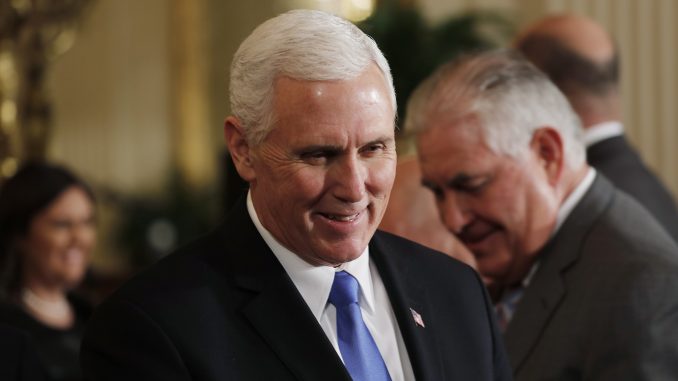
WASHINGTON, D.C. — Vice President Mike Pence will visit Egypt, Jordan and Israel from Jan. 20 to 23, the White House said this week, embarking on a tour originally planned for last month after President Donald Trump recognized Jerusalem as the capital of Israel.
Pence will hold talks with Egyptian President Abdel Fattah al-Sisi, Jordan’s King Abdullah and Israeli Prime Minister Benjamin Netanyahu, the White House said in a statement.
Pence, a strong supporter of Trump’s decision on Jerusalem, will also visit the city’s Western Wall and give a speech at the Israeli parliament, it said.
Trump’s decision on Jerusalem and announcement in December that the U.S. would start the process of moving its embassy from Tel Aviv led to uproar and protest in the region.
“At President Trump’s direction, the vice president is traveling to the Middle East to reaffirm our commitment to work with the U.S.’s allies in the region to defeat radicalism that threatens future generations,” said Alyssa Farah, a spokeswoman for Pence.
He plans to discuss with the three leaders “ways to work together to fight terrorism and improve our national security,” she added.
The status of Jerusalem, which is home to Muslim, Jewish and Christian holy sites, is one of the thorniest obstacles to a peace deal between Israel and the Palestinians, who protested Trump’s move and have declined to meet with Pence.
Pence postponed a planned visit to Egypt and Israel last month to stay in Washington for a congressional vote on Trump’s tax overhaul plan.
The announcement on Pence’s visit came the same day that Jordan announced it had foiled an Islamic State plot that included plans for a series of attacks last November on security installations, shopping malls and moderate religious figures.
Jordan’s state news agency, Petra, said the country’s intelligence department had arrested 17 members of the cell and confiscated weapons and explosives that the militant group had planned to use in several operations.
“The members of the cell had planned to execute a number of terrorist attacks simultaneously to destablize national security and sow chaos and terror among civilians,” the statement said.
The detainees were being interrogated before being put on trial in a military court, the authorities said without giving a date.
The statement said the cell had planned to wage a series of bank robberies and car thefts to get financing, and manufactured homemade explosives from material bought from local markets.
Militants from al-Qaida and other radical jihadist groups have long targeted the U.S. allied kingdom and dozens of militants are currently serving long prison terms.
King Abdullah, a Middle East ally of Western powers against Islamist militancy who has also safeguarded Jordan’s peace treaty with Israel, has been among the most vocal leaders in the region in warning of threats posed by radical groups.
Jordan plays a prominent role in the U.S.-led coalition against Islamic State, providing military, logistical and intelligence support, Western diplomats and regional intelligence sources say.
Several incidents over the past few years have jolted the Arab kingdom, which has been comparatively unscathed by the uprisings, civil wars and Islamist militancy that have swept the Middle East since 2011.
In the last major incident, Islamic State militants claimed responsibility for a shootout just over a year ago at a Crusader castle in the southern city of Karak in which 10 people, including a Canadian tourist, were killed.



